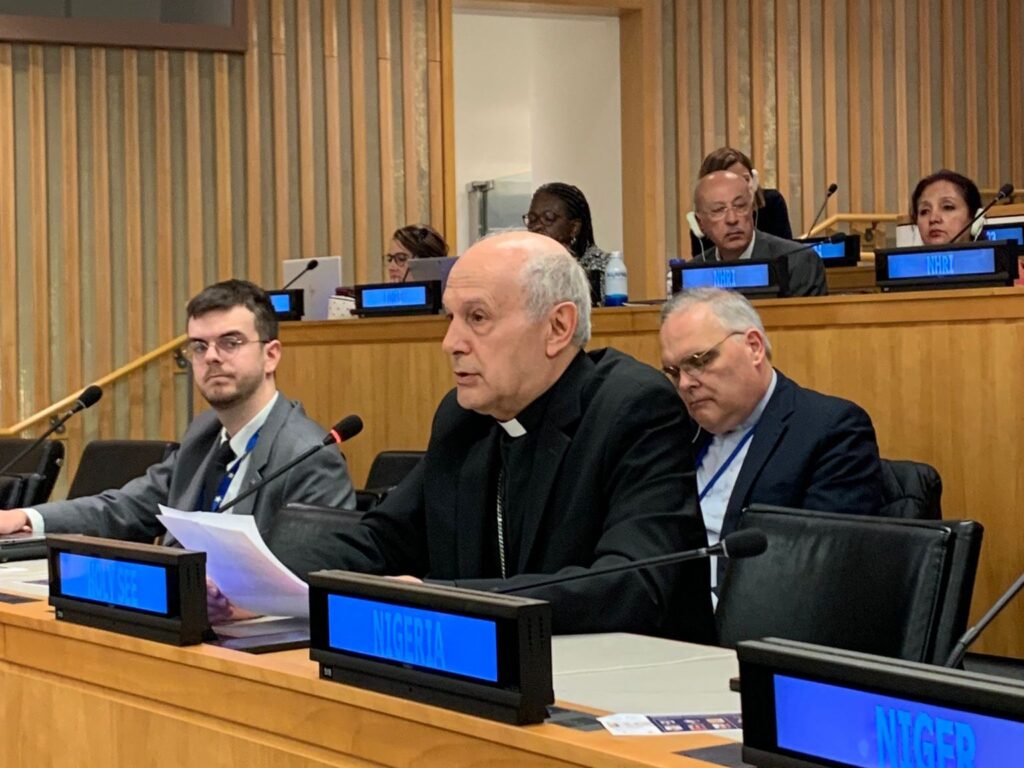
Vatican Representative Delivers Statement on Aging, Dignity of the Elderly, at United Nations
By: The Good Newsroom
“The valuable contribution that older people can make, not only to their families but to society as a whole, should be recognized,” Archbishop Gabriele Caccia said

On May 20, 2024, Archbishop Gabriele Caccia, Permanent Observer of the Holy See to the United Nations, issued a statement during the 14th session of the Open-Ended Working Group on Aging.
In his remarks, Archbishop Caccia discussed the ways in which cities and rural towns are built that can facilitate or impede the ability of older persons to participate in community life. He highlighted the importance of affordable and accessible housing for older persons. He stressed that older persons should not be isolated but encouraged to maintain proximity with younger generations, as with intergenerational housing.
Archbishop Caccia noted that participation in public life and decision-making processes cannot be limited to the political and civil rights of the individual and should extend to the formation of shared living bonds of belonging. He expressed deep concern that older persons “perceive themselves to have a lesser stake in the future.” He emphasized that when society offers suicide instead of compassionate accompaniment, the equal dignity of all persons at every stage of human life until natural death is ignored.
The text of the statement follows:
“Mr. Chair,
“The Delegation of the Holy See is grateful to Your Excellency and the Bureau of the Open-ended Working Group on Aging for the preparation of this 14th Session.
“The manner in which cities and rural towns are built can facilitate or impede the ability of older persons to participate in community life. Among the key aspects of housing for older persons are affordability and accessibility, particularly for those on limited or low incomes. Proximity and access to groceries, health, social and spiritual care, and public services are also important considerations. Infrastructure, transit, and housing projects should better respect the limitations in mobility, sight, and hearing of older persons as well as their pace. Furthermore, older persons should not be isolated in separate locations but rather encouraged to maintain proximity with younger generations. Intergenerational housing projects serve as a prime example for this. In conjunction with their families and informal carers, older persons should be provided with assistance in adapting their homes to their changing needs, without being forced to relocate.
“The participation in public life and decision-making processes cannot be limited to the political and civil rights of an individual, it should extend to the formation of shared living bonds of belonging. Grandparents, drawing on their own experiences, can offer valuable insights and perspectives to their grandchildren. The valuable contribution that older people can make, not only to their families but to society as a whole, should be recognized. Instead, their isolation and the lack of effective support can drive them to despair and even to the desperate decision to desire to hasten the end of their lives. It is deeply concerning that older persons perceive themselves to have a lesser stake in the future, which can be attributed to the ‘throwaway culture,’ which views them as unneeded and disposable.[1] When society offers suicide instead of compassionate accompaniment, the equal dignity of all persons at every stage of human life, until natural death, is ignored. The Holy See encourages efforts that make “each feel accompanied and cared for, even in the most delicate moments of his or her life.”[2]
“Mr. Chair,
“A truly inclusive society is one which welcomes the presence and perspectives of older persons as cherished members of the human family and takes meaningful steps to ensure they “take an active part in the life of society as agents of change.”[3] It is only through this approach that the dignity and rights of older persons can be fully respected.
“Thank you, Mr. Chair.”

